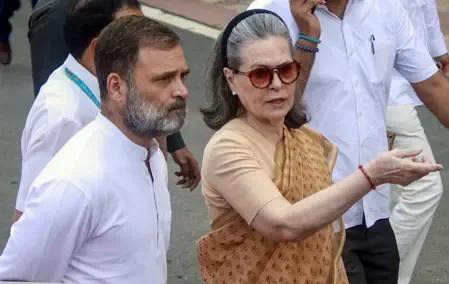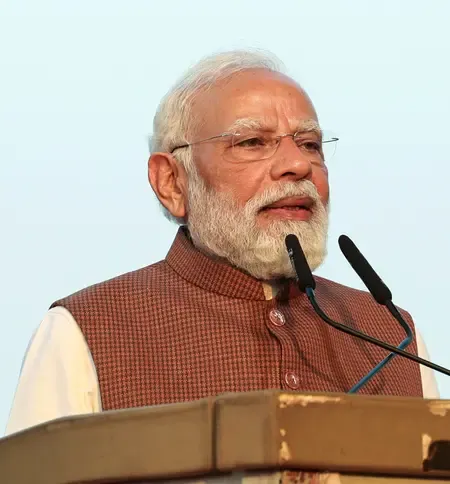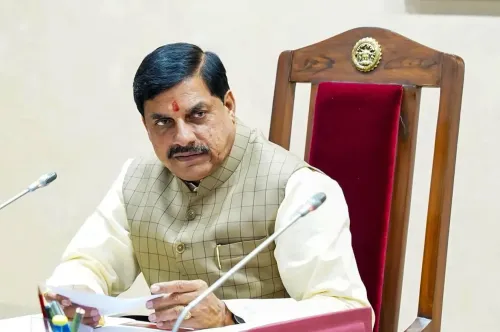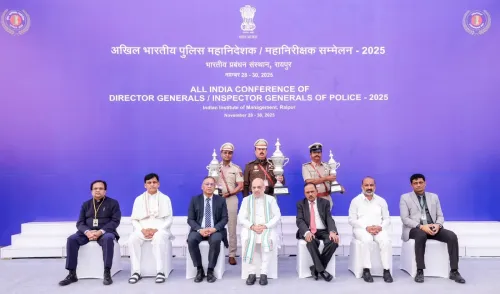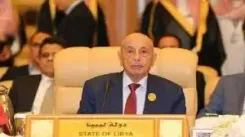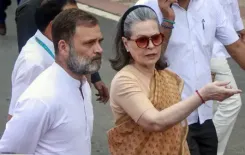How Can We Make Cities Secure, Resilient, Inclusive, and Future-Ready?
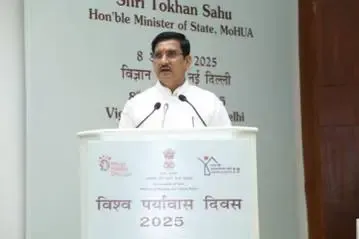
Synopsis
Key Takeaways
- Focus on resilience: Cities must enhance their infrastructure to withstand crises.
- Empower local governments: Local authorities play a crucial role in urban development.
- Public-Private-People Partnerships: Collaboration is key for sustainable growth.
- Inclusive policies: Ensure marginalized communities are prioritized.
- Transformative actions: Challenges can lead to innovative solutions for urban areas.
New Delhi, Oct 8 (NationPress) The Ministry of Housing and Urban Affairs (MoHUA) commemorated World Habitat Day 2025 on Wednesday (October 8) at Vigyan Bhawan in New Delhi, focusing on the theme ‘Urban Solutions to Crisis’.
This theme emphasizes how cities can enhance their preparation for becoming resilient, inclusive, and sustainable while also addressing challenges like climate change, migration, and urbanization.
The event was graced by the Union Minister of State (MoS) for Housing and Urban Affairs, Tokhan Sahu, as the guest of honour.
Other attendees included Srinivas Katikithala, Secretary of MoHUA, Satinder Pal Singh, Additional Secretary, MoHUA, Kuldip Narayan, Joint Secretary and Mission Director, Housing for All/Housing Division, Shombi Sharp, United Nations Resident Coordinator, UN-INDIA, along with senior officials from MoHUA and CMDs of autonomous organizations.
In his keynote address, the MoS underscored the significance of sustainable urbanization in relation to a country’s developmental trajectory, asserting that every city should be both dignified and filled with opportunities for its residents.
The MoS further clarified that the theme of World Habitat Day 2025 transcends a mere calendar year; it serves as a reaffirmation of India’s unwavering commitment to constructing cities that are resilient, inclusive, sustainable, and equipped to handle crises while emerging stronger.
He stated, “By investing wisely in resilience, empowering local governments, and leveraging the potential of Public-Private-People Partnerships, our cities will not only withstand crises but also evolve into robust engines of growth.”
In his address, the Secretary of MoHUA remarked that the policy response to urban crises should aim at fortifying cities by enhancing their infrastructure, social systems, and economies to be more resilient and adaptable. He expressed optimism that despite the numerous challenges cities face, they present unique opportunities for transformative actions, fostering a positive cycle of growth and resilience.
“India’s strategy is directed by a clear vision to transform these challenges into a cornerstone for future growth and prosperity,” the Secretary added.
He also referred to various flagship initiatives of the Ministry, such as PMAY-Urban, AMRUT, PM SVANidhi, and the Swachh Bharat Mission, designed to focus on vulnerable and marginalized communities. Together, these initiatives represent an integrated, multi-faceted strategy aimed at achieving infrastructure development alongside social inclusion, climate action, and economic empowerment.
The event also featured the release of publications from organizations under MoHUA, including the Housing for All (HFA) Division, HUDCO, NCHF, NHB, CGEWHO, and BMTPC. The HFA division unveiled a ‘Compendium of Good Practices’ showcasing successful implementations of the Pradhan Mantri Awas Yojana – Urban (PMAY-U) across States and UTs.
In addition to the publication release, a prize distribution ceremony recognized winners of painting competitions organized by NHB, CGEWHO, HUDCO, and BMTPC for school children, including specially-abled participants, in various creative contests.
In alignment with the vision of ‘Viksit Bharat 2047’, multiple panel discussions were conducted on subjects such as ‘Integration of Urban and Peri-urban Areas into Metropolitan Cities’, ‘Understanding and Responding to Urban Flooding’, and ‘Equitable Cities’.
These discussions gathered policymakers, practitioners, researchers, and subject matter experts, who shared insights aimed at making cities inclusive, livable, equitable, and sustainable, ensuring no citizen is left behind.

